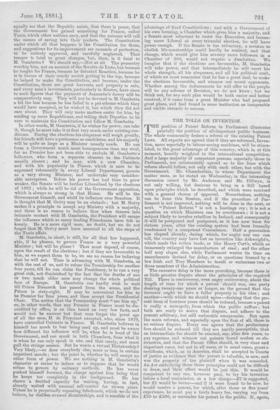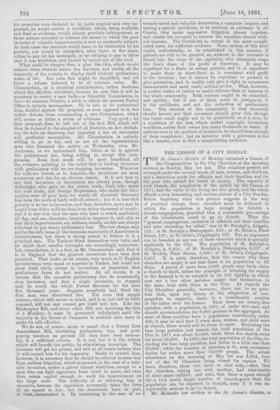THE TOLLS ON INVENTION.
THE position of Patent Reform in Parliament illustrates painfully the position of all-important public business. The whole community desires a reform of the existing Patent Laws. All experts are agreed that if they are reformed, Inven- tion, more especially in labour-saving machines, will be stimu- lated, to the great advantage of this country, which is, at this moment, heavily weighted in the international competition. And a large majority of competent persons, especially those in Parliament, are substantially agreed as to the lines which reform should follow, not only with each other, but with the Government. Mr. Chamberlain in whose Department the matter rests, as he stated on Wednesday, in the interesting discussion raised by Mr. Anderson and Mr. Dillwyn, is not only willing, but desirous to bring in a Bill based upon principles which he described, and which were received with a general chorus of approval. Nevertheless, nothing can be done this Session, and if the procedure of Par- liament is not improved, nothing will be done in the next, or next. "Patent Reform " is not a hustings cry ; it is not a question on which Ministers can be overthrown ; it is not a subject likely to involve rebellion in Ireland, and consequently it will be postponed and postponed, as it has now been for sixteen years, after the existing system had been formally condemned by a competent Commission. Half a generatiou has elapsed already, during which, for aught any one can tell, the country may have lost an invention like Arkwright's, which made the cotton trade, or like Henry Oort's, which so immensely enlarged the manufacture of steel ; and the other half may elapse also, while Parliament wastes its time on amendments devised for delay, or on questions framed by a few Irish and Tory Members to insult or embarrass two or three members of the Administration.
The excessive delay is the more provoking, because there is so little genuine dispute about the principles of the required Bill. There is controversy, even angry controversy, about the length of time for which a patent should run, one party desiring twenty-one years or longer, on the ground that the inventor ought to have a fuller property in his idea ; and another—with which we should agree—desiring that the pre- sent term of fourteen years should be reduced, because a patent is really a monopoly, from which the public suffers ; but both are ready to waive that dispute, and adhere to the present arbitrary, but still endurable compromise. But upon the main reforms, and especially upon the first of all, there is no serious dispute. Every one agrees that the preliminary fees should be reduced till they are hardly perceptible, that an intermediate fee should be exacted, say, after five years, to pay expenses and winnow out patents found useless or ob- structive, and that the Patent Office should, in very clear and important cases, but not in all cases, or in usual cases, grant a certificate, which, as in America, shall be accepted in Courts of justice as evidence that the patent is valuable, is new, and was the property of the plaintiff when it was conceded. An Act embodying those three principles could not be difficult to draw, and their effect would be just this. It would be competent to any one, however poor, to lay his invention before a local commission, at a low charge—£7 is suggested, but £1 would be better—and if it were found to be new, he would receive a patent, for which, after three or five years' experience, he must pay a fairly heavy fee, varying say from £50 to £500, or surrender his patent to the public. If, again, his invention were declared to be quite original and very im- portant, he would receive a certificate which, being available and final as evidence, would almost preclude infringement, or those actions intended to exhaust his means to which the poor inventor of valuable improvements is now so constantly subject. In both cases the inventor would cease to be obstructed by his poverty, yet would be compelled, after three or five years, either to pay for his monopoly, or by refusing to pay to allow that it was worthless, and should be carted out of the road.
What could be simpler than a plan like this, which would remove every obstacle before the inventor, and enable all the ingenuity of the country to display itself without preliminary waste of life. But even this might be simplified, and yet leave a reform believed to be of extreme value. Mr. Chamberlain, as a practical administrator, rather hesitates about the effective certificate, because he sees that it will be necessary to create a new body—a Scientific Commission, in fact—to examine Patents, a work to which the present Patent Office is entirely incompetent. He is not, as we understand him, decided against the proposal, or even opposed to it, but rather shrinks from constructing a new Commission, which will arouse so bitter a storm of criticism. Very good ; let that proposal, then, be left out of the first Bill, which will then be reduced to the simplest of all Statutes, an Act abolish- ing the tolls on discovery, but imposing a tax on successful and profitable monopolies. Mr. Chamberlain is entirely willing to go so far, and so are all the representative men who discussed the matter on Wednesday, even Mr. Anderson, as we understand him, bitter as he is against the preliminary tax, being willing to accept this com- promise. Even that much will be most beneficial, all the evidence pointing to the belief that in loading inventors with preliminary tolls we are stopping invention. Wherever the tolls are lowest, as in America, the inventions are most 'numerous, and this for an obvious reason. It is not true to .say that inventors or discoverers are always poor, though -Arkwright, who gave us the cotton trade, Cort, who made • the steel trade, and George Stephenson, who made the loco- motive, were all poor men, for nearly all electrical discovery has been the work of fairly well off savants ; but it is true that poverty is no bar to invention, and that, therefore, more may be 'hoped from thirty millions than from thirty thousand of people ;
• and it is also true that the men who have to watch machinery all day, and are, therefore, tempted to improve it, and able to test their improvements, are artisans, usually unable and always reluctant to pay heavy preliminary fees. The low charge may not be the only cause of the immense superiority of Americans in inventiveness, but there is strong reason to believe it is a principal one. The Yankees think themselves very 'cute, and no doubt their smaller triumphs are exceedingly numerous ; but, nevertheless, it is a fact, as Mr. Chamberlain said, that it is in England that the greatest inventions have been first patented. That looks, at all events, very much as if English inventiveness were equal or superior to 'Yankee, but could not show itself fairly, except in inventions so important that preliminary taxes do not matter. At all events, it is certain that the excessive preliminary fees do occasionally stop invention, and that a single invention so stopped may be worth the whole Patent Revenue for the next five thousand years. Suppose somebody had fined the first man who discovered fire. Yet even this simple scheme, which will secure so much, and is so just and so little 'opposed, will not and cannot get itself into law. Like the Bankruptcy Bill, and every other Bill not involving the fate of a Ministry, it nmet be postponed indefinitely until the .majority in the louse of Commons is enabled once more to make its will effective.
We do not, of course, mean to assert that a Patent Law Amendment Bill, abolishing preliminary fees, and post- poning taxation on patents till they have been success- ful, is a sufficient reform. It is not, but it is the reform
• which will benefit the public, by stimulating invention. The dnventor will get his patent, and will at all events believe that it will reward him for his ingenuity. Really to reward him, however, it is necessary that he should be relieved in some way from endless litigation, which at present, in the case of a valu- able invention, makes a patent almost worthless, except to a man who can fight opponents from court to court, and even then retain capital enough to work his improvement on
the large scale. The difficulty of so relieving him is
excessive, because the opposition necessarily takes the form of an appeal to law ; but the Americans have in part, at least, surmounted it. By instituting in the case of ex-
tremely novel and valuable discoveries a complete inquiry, and issuing a special certificate, to be received as evidence in all Courts, they make oppressive litigation almost hopeless, and enable the inventor to recover his royalties almost with- out expense. The Certificate is, except in the most compli- cated cases, his sufficient evidence. Some system of this kind ought, undoubtedly, to be established in this country, if patents are still to be granted, as, without it, the inventor is forced into the arms of the capitalist, who ultimately reaps the lion's share of the profit of discovery. It may be expedient for a State to refuse patents, and it is expedient to make them as short-lived as is consistent with profit to the inventor ; but it cannot be expedient to pretend to give protection, and in reality only give a right to commence innumerable and most costly actions-at-law. That, however, is matter rather of justice to useful citizens than of concern to the whole community. Both reforms ought to be conceded, and quickly ; but if one of them must be postponed, it is the certificate, and not the reduction of preliminary fees. The interest of the community is that inventors should invent, not that inventors should grow rich, though the latter result ought not to be prohibited, as it is now, by a condition of the law, which makes copyright inventions worthless, unless their owner has many thousands to waste. If authors were in the position of inventors, we should hear enough of their complaints ; but an inventor with a grievance is too like a lunatic, ever to find a sympathising audience.

































 Previous page
Previous page